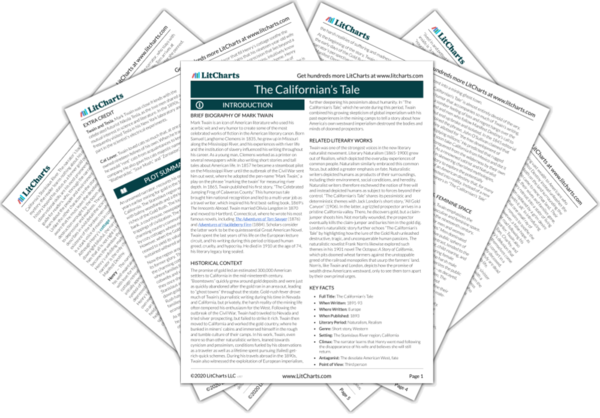The decorated cottage where Henry lives is a symbol of feminine nurturement and beauty in an otherwise desolate and depressing male-dominated environment. Manifest Destiny promised vast riches for those individuals willing to carve their own destinies out of the wilds of the American west, but Twain suggests that such an overemphasis on the “masculine” spheres of labor and wealth acquisition neglects the important role that women play in creating domestic spaces for families and tenderness to flourish. When the narrator first sees Henry’s cottage, he immediately notices that it appears “petted and cared for and looked after,” a striking contrast to the “hard, cheerless, materialistic desolation” of miners’ cabins. Inside the cottage are the hallmarks of a female presence that the outside environment lacks, including the beautiful decorations and soft furnishings that transform the cottage from a mere shelter into a nurturing home. Despite Henry’s delusions about his wife’s disappearance, the cottage provides the only comfort remaining in his life. The cottage is a symbol of the female space and presence that Manifest Destiny's boom and bust capitalism has stripped away, to the detriment of the men who remain on the Stanislaus. Twain therefore suggests that a blending of masculine and feminine influence is essential to human well-being.
Henry’s Cottage Quotes in The Californian’s Tale
In the country neighborhood thereabouts, along the dusty roads, one found at intervals the prettiest little cottage homes, snug and cozy, and so cobwebbed with vines snowed thick with roses that the doors and windows were wholly hidden from sight.
That was all hard, cheerless, materialistic desolation, but here was a nest which had aspects to rest the tired eye.
“I've seen her fix all these things so much that I can do them all just her way, though I don't know the law of any of them. But she knows the law. She knows the why and the how both; but I don't know the why; I only know the how.”
I was feeling a deep, strong longing to see her—a longing so supplicating, so insistent, that it made me afraid.
[A] loving, sedate, and altogether charming and gracious piece of handiwork, with a postscript full of affectionate regards and messages to Tom, and Joe, and Charley.
Charley fetched out one hearty speech after another, and did his best to drive away his friend's bodings and apprehensions.
Joe brought the glasses on a waiter, and served the party. I reached for one of the two remaining glasses, but Joe growled, under his breath: "Drop that! Take the other." Which I did. Henry was served last.
Never has been sane an hour since. But he only gets bad when that time of the year comes round. Then we begin to drop in here, three days before she's due, to encourage him up.












